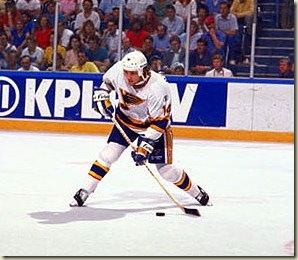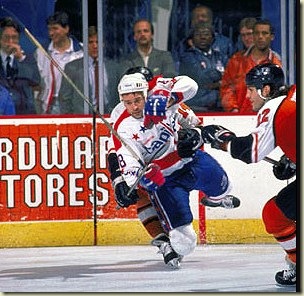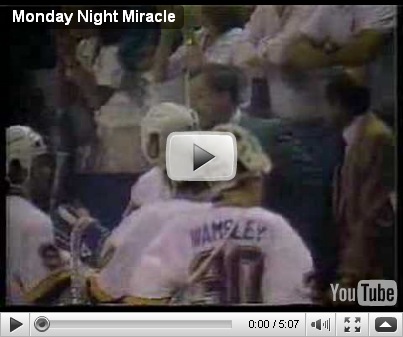Today would be Doug Wickenheiser’s 49th birthday had a battle with cancer not taken his life in January of 1999.
Wickenheiser is always remembered as the bust first-round pick of the Montreal Canadiens in the 1980 NHL Entry Draft.
At the time of the draft, The Hockey News pointed to Wickenheiser as the best available prospect out there. After all, he had just captained his hometown Regina Pats to a berth in the Memorial Cup, registered 170 points in the regular season and was CHL player of the year.
 Captain Doug Wickenheiser leads the 1980 WHL Champions Regina Pats around the ice. Photo: Marcia Wickenheiser Collection
Captain Doug Wickenheiser leads the 1980 WHL Champions Regina Pats around the ice. Photo: Marcia Wickenheiser Collection
With the Canadiens coming off their first season without a Stanley Cup in five years, GM Irving Grundman was under the gun to bring Stanley Cup glory back to Montreal.
The Canadiens first overall pick came from a deal, made by Sam Pollock, with the Colorado Rockies in September of 1976. The two teams exchanged 1980 draft picks and the Rockies received Ron Andruff and Sean Shanahan as part of the deal.
Essentially Pollock left Grundman a gift when he retired in 1979.
The Canadiens had to consider Wickenheiser, highly touted defenceman Dave Babych and a diminutive Quebec forward named Denis Savard as potential choices.
Savard brought the possibility of a potential francophone star to follow the footsteps of Lafleur, and was the choice of Canadiens coach Claude Ruel.
A more recent comparison to the francophone pressure that often rests on the Canadiens shoulder, might be Montreal’s choice to select Louis Leblanc first overall in 2009.
With the Big Three (Larry Robinson, Serge Savard and Guy LaPointe) getting on in years, Babych would be a good compliment to the younger corps of Canadiens blueliners such as Rod Langway and Gaston Gingras.
Wickenheiser brought size, speed and skill, from the traditionally physical WHL, something the Canadiens were missing since the departure of Jacques Lemaire in 1979.
With the advice assistant GM and director of player personnel Ron Caron, Grundman went with the Saskatchewan native.
“It’s certainly a great feeling to be drafted by Montreal,” the 19-year-old said upon being selected. “It’s a great honour to be with a team like Montreal with such a winning tradition.”
Babych would go to Winnipeg and Savard went to Chicago. Two other defensemen, Larry Murphy (LA) and Paul Coffey (Edmonton), would be picked fourth and sixth. Four of these picks played over 1000 games, and three are in the Hall of Fame. None are named Wickenheiser.
In his rookie season, the young center spent nearly half the season in the press box and registering 15 points in 41 games. Much of the criticism went towards coach Ruel’s misuse of the team’s top pick.
Hall of Fame defenseman Larry Robinson, in his book “Robinson: For the defense”, felt that Ruel did not like him and speculates that his refusal to play Wickenheiser was partly in protest to Grundman not selecting Savard.
 Doug Wickenheiser - HHOF photo
Doug Wickenheiser - HHOF photo
His sophomore season wasn’t much better, with 35 points in 56 games.
Things appeared to turn around in his third season. Playing on a line with Ryan Walter and the legendary Guy Lafleur, he recorded his career best of 55 points (25 goals) in 78 games.
"It's said that it took Guy Lafleur three years to develop, but it seems they always forget that he played all the games for those three years,'' Wickenheiser said in a 1981 interview with the Regina Leader-Post.
For comparison’s sake, Denis Savard already had 315 points in his first three seasons with the Blackhawks.
Wickenheiser injured his back, in a collision with a goal post, during a March 30 game against Pittsburgh and missed the ‘83 playoffs. In fact he would never appear in the post-season with the Canadiens.
Things did not improve and midway into the 1983-84 season, with Serge Savard now running the show, he was traded to the St. Louis Blues. There he would be reunited with Caron, now the Blues’ GM.
“I hate the idea of leaving this place, but I feel it’s best for my career.” Wickenheiser said on being traded. “Things never worked out here. The pressure is off my shoulders. I have no bitterness against the organization. Unfortunately things didn’t develop as I hoped they would.”
Many thought maybe he would turn into a 40-goal scorer away from Montreal. That never happened.
 Wickenheiser’s best personal success came with St. Louis – HHOF Photo
Wickenheiser’s best personal success came with St. Louis – HHOF Photo
He would play three full seasons with the Blues, where he eventually settled and met his wife. His fist full season looked promising (23 goals in 68 games) before a freak accident put him out for the season with a knee injury.
Wickenheiser’s most famous goal came in the Blues’ “Monday Night Miracle” in Game 6 of the 1986 Campbell Confrence Finals
After a season in Vancouver, a single game with the Rangers, parts of two in Washington, as well as time on the Canadian national team, he was out of the NHL.
 Wickenheiser with the Washigton Capitals – HHOF photo
Wickenheiser with the Washigton Capitals – HHOF photo
He would play in Italy in 1990-91 and share the next season with a pair of German league teams as well as an Austrian club.
Returning to North America, he played a season each in the IHL with Peoria (1992-93) and Fort Wayne (1993-94).
Wickenheiser would get a drastic change in life that summer when he had surgery to remove a cyst from his left wrist. The cyst was found to bee malignant, forcing him to retire from playing hockey and seek treatment for bone cancer.
He remained cancer free for three years, until the dreaded disease returned in the form of a lemon size tumor in his lung. Nine months later, cancerous lesions were found in his brain. Both forms were inoperable.
After a lengthy battle, Doug Wickenheiser lost his battle on January 12, 1999. He was just 37 years old and left behind his wife and three daughters.
Even though his NHL career never reached the level of expectation from that draft day in 1980, Wickenheiser’s dedication to the game and community involvement won’t be forgotten.
After his passing the Regina Pats retired his No. 12 jersey and an arena in Regina is named after him.
The WHL’s humanitarian of the year award was renamed the Doug Wickenheiser Memorial Trophy in May 2001.
With such a great involvement with his adopted community of St. Louis, the Mid-States Hockey Association created a tournament in his name (The Wickenheiser Cup) for the lower-tier/small high school championship.
The Blues set up the Wick 14 Fund (Wickenheiser wore #14 in St. Louis) just prior to his passing in 1998. It has been since renamed the St. Louis Blues 14 Fund.
 A commemorative banner also hangs from the rafters of the Scottrade Center. Only ight other Blues players have their numbers honoured or retired.
A commemorative banner also hangs from the rafters of the Scottrade Center. Only ight other Blues players have their numbers honoured or retired.
In 2004, the Regina Sports Hall of Fame inducted Doug Wickenheiser.
Related Links:
Habsworld: The Forgotten Habs - Doug Wickenheiser
Resources
The Associated Press - June 12, 1980/April 1, 1983
The Montreal Gazette – June 12, 1980/December 22, 1983
The Regina Leader Post – September 21, 2007
Pepple, Todd: “The Last Face-Off: The Doug Wickenheiser Story”
Robinson, Larry: “Robinson For the Defence”








No comments:
Post a Comment